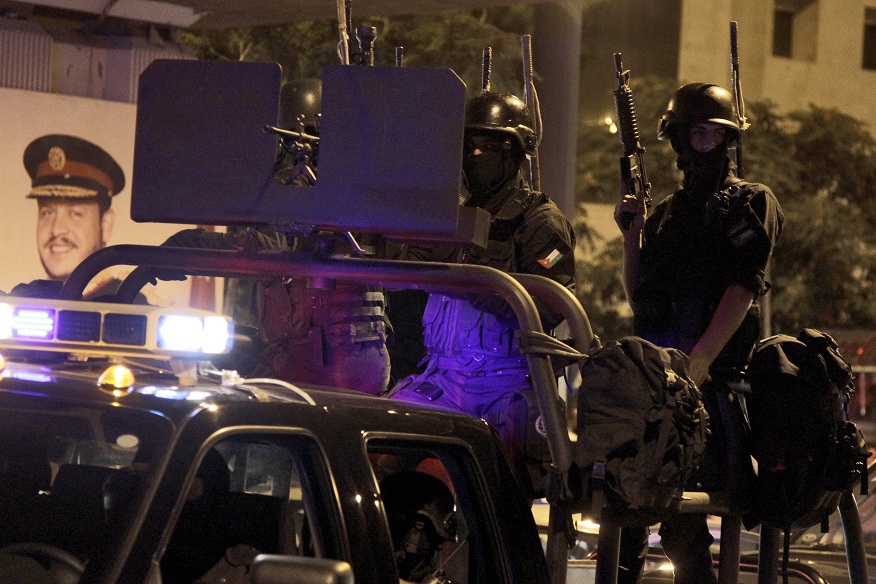I hadn’t intended to see “Battle for Haditha. Out of personal choice, I had decided not to. But as usual Cairo Film Festival cock-up would have it, “Reservoir Dogs could not, for some technological reason, be shown. For once, waiting a good half an hour for a film I hadn’t wanted to see turned out to be a blessing in disguise.
The “Battle for Haditha began in August 2005 after an attack on the American Marine Corps that left 10 dead. On the morning of Nov. 20, as part of the operation to quell the heavy insurgency, Marine Lance Corporal Miguel Terrazas was killed with an improvised explosive device (IED) on the outskirts of the Iraqi town Haditha. Hot-headed and seething with fury, his comrades’ response to this was the brutal massacre of 24 men, women and children in the nearby houses.
It’s not only the shock and controversy caused by a film about Iraq that makes “Battle for Haditha arguably one of the most important films of the past few years, it’s also the fact that the events depicted took place only two years ago. It’s easy to gauge the significance of this film considering how long it took before condemnatory films were being made by Americans about the Vietnam War.
Sitting through “Haditha was like sitting through a strange and inexorable nightmare. We know the sequence of events – or we should – since it is the biggest of the violations brought against the US military after Abu Ghraib. It was charged against the soldiers themselves, and although a number of officers resigned, the status quo at the top brass was hardly shaken.
What makes Broomfield’s cinematic documentary not just another “Jarhead or “Black Hawk Down is the sympathetic narrative space it affords for the three sides: the two Iraqis – Jaafar and Ahmed – who placed the bomb, the innocent Iraqi families murdered, and the American soldiers who committed the massacre.
In fact, the exploitation of soldiers by the upper-ranks is one of Broomfield’s main concerns. He paints the American soldiers as sympathetic characters. Although with an absence of Arabic subtitles, and shots of one marine thrusting his naked rear out of a racing truck, this may have been made redundant before a Middle Eastern audience.
Yet no one in the audience could have doubted the suffering of Ramirez, played by Elliot Ruiz, himself an Iraq veteran. Ramirez had joined the marines to escape the streets of the murder capital Philadelphia, but was offered permanent leave after an injury that nearly cost him his leg.
However, with the measly sum that had been offered to him as retirement, he decided to keep working in the marines, despite suffering recurring nightmares.
Broomfield s attempt to depict the sufferings of the US soldiers and the Iraqis may not have been understood by those less empathetic to the subtle complexities of human nature. And so, with typical hypercritical sanctimony, one of my fellow viewers, who clearly had interpreted the documentary as a battle between good and evil, gave a solitary but very audible round of applause as the American driven Hum Vee exploded over the IED.
However, despite the importance of defending soldiers’ humanity, it is the writing of Arabs as three dimensional characters and not merely faceless victims or villains which still eludes most would-be sympathetic productions about Middle Eastern affairs and/or American foreign policy.
Still, “Haditha traverses cultural boundaries to reach a common humanity. This is no doubt helped by the use of the documentary technique, which naturally rejects the glamour and cliché of revelation film in favor of the mundane but often far more touching simplicities.
The tenderness of Heba and Rashid’s relationship as newlyweds is cinematically forged with deep sensitivity. The audience watches some evocative romantic moments between them as, with probably the most natural onscreen kiss in years, they share their excitement over their unborn baby.
The vulnerability of the human life, as we watch Heba’s innocent family wrapping themselves in blankets as if to protect themselves, surrounds the film. If Broomfield has been accused of being a provocateur, then whoever levels such accusations over this production should think carefully. If there something provocative about showing Iraqi victims as they are, or rather in this case, as they were, then moviemakers and critics alike should make a conscious assessment as to what extent foreign policy controls cinema.
The third party is that of the duo Ahmed and Jafar who – employed and exploited equally by the higher ranks of the insurgency – plant the IED outside Heba and Rashid’s family house. Ahmed, a family man and a nationalist, is aware of the atrocities that resulted from the IED. The camera follows him to his home, where he is filmed holding his daughter in tears.
Ahmed is not overly religious, and despite the assurance of the Mullah that these victims are martyrs, he still feels a haunting regret.
Broomfield’s highly disturbing film is essential watching. Taking the viewer directly into the events themselves, there is no cinematic foreboding that looms over narrative, except of course the knowledge we already have.
Being an uncomfortable journey into the heart of Iraq, rather than a blatant but less humane Hollywood critique of its management at the highest level, it is unlikely that this film will be a box office hit. Should this film fail to attract viewers, it will be another tragedy: A human disregard for an atrocity they would rather ignore.

